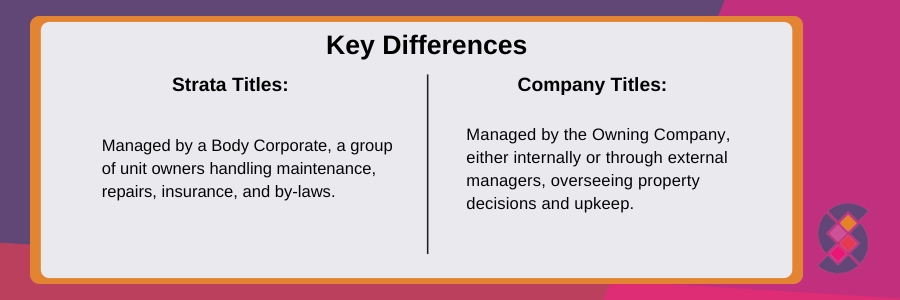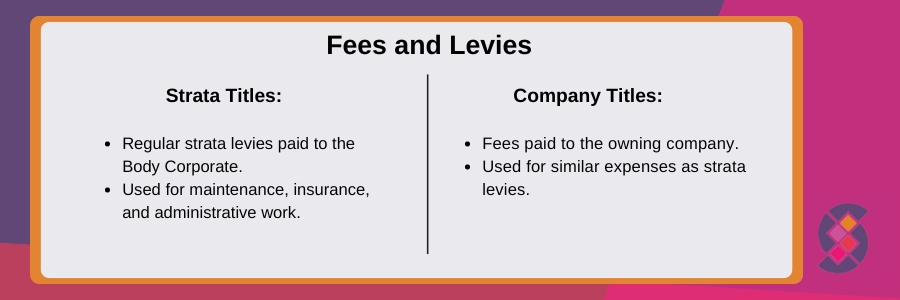Strata vs Company: What’s the Difference?
The terms “strata” and “company” are often mistakenly used interchangeably by property owners and investors, resulting in unforeseen issues. Though both strata and company titles share some similarities, they invariably refer to different types of multi-unit property ownership arrangements.
Whether you’re a prospective buyer, investor, or tenant, it’s important to have a full understanding of the key differences between strata and company properties in order to make an informed decision when it comes to ownership or tenancy. This guide will provide a comprehensive breakdown of both company and strata titles in the context of property law and real estate in Australia.
Strata Titles
Strata titles, sometimes referred to as strata schemes, are a type of real estate ownership arrangement for multi-unit properties such as apartment buildings, townhouses, or condominiums. Owners in a strata title each hold respective ownership over their lot as well as shared ownership for common property in the strata property such as driveways, corridors, and other facilities that can be accessed by all residents.
The collective ownership of a strata property is managed through a strata corporation made up of all individual owners, also known as a body corporate. The body corporate sets its own rules (by-laws) for all residents of the strata property and manages the upkeep of the common areas from repairs and maintenance to insurance.

Vs Company Titles
Company titles run in a very similar way to strata titles, with the exception that the ownership of the property is held by a company rather than the collective of individual lot owners. In a company title, the company holding ownership sells a right to occupy lots of the property to individual owners who are issued with a share certificate of the company. This company share is also what provides owners with indirect ownership over the common property of the company title.
Company titles have historically been used for multi-unit properties prior to 1967, but are now relatively uncommon in South Australia. Most company titles in SA have been converted into community titles, but there are still some that retain their original ownership arrangement.
Differences Between Strata and Company Titles
With the definitions for both strata and company titles out of the way, let’s dive into what sets them apart, and the implications that these differences can have for owners, investors, and tenants.
Ownership
The most immediate difference between strata and company titles is around ownership arrangements. With strata titles, each individual owner retains sole ownership of their specific lot or unit.
In a company title, however, buyers are given a share of the company that owns the entire property. This may seem like a small difference, but it can often complicate the purchase process due to the inclusion of the company share. For example, some banks have shown a reluctance to provide loans for company title units or offer stricter terms for lenders.
Management
Strata titles are managed collectively by the body corporate, which is made up of all the individual unit owners who gather periodically to make decisions regarding the upkeep of the entire strata building. Any repairs or maintenance work is funded and facilitated by the body corporate on behalf of all owners.
Similarly, the management requirements of a company title will fall to the company that holds ownership of it. The company or developer will either handle the management needs of the building on their own or engage an external company to do so.
Fees and Levies

Both strata titles and company titles will require buyers to contribute to the cost of managing the property — the main difference comes down to who the fees are paid to. Owners in a strata title pay regular strata levies to the body corporate and use them to finance expenses related to maintenance, insurance, or other administrative work. Buyers in a company title also pay fees for the same reason, except to the company in ownership of the property instead.
Which is better, a strata title or a company title?
The comparison between strata titles and company titles is less about which is ‘better’, and more about what buyers and owners are comfortable with. Naturally, strata titles offer a simplified approach for buyers and owners due to the straightforward nature of ownership over the unit and common property. That being said, there are some ways in which company titles can be used — provided buyers and owners know how to navigate the responsibilities of owning a share of the company.
At Strata Data, we offer award-winning strata management services in Adelaide for both strata titles and company titles. Our services cover all aspects of strata title and company title management from compliance to maintenance, to body corporate insurance.



